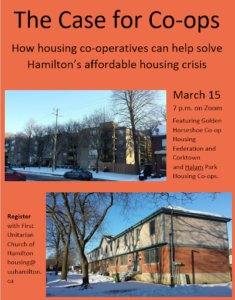The Affordable Housing Team was delighted that 49 people or more joined our Zoom event, The Case for Co-ops, on March 15, 2022. It was a great conversation. Several co-op residents talked about why they love co-op housing and we learned about the challenges of adding new units.
 Here are three recommendations that came out of the session:
Here are three recommendations that came out of the session:
- The Ontario government needs to amend the funding formula for housing co-ops governed by the Housing Services Act. The formula has an unintended consequence that when a co-op’s mortgage is paid off. Instead of receiving subsidies, it may face “negative subsidies”—that is, it would have to pay money to the municipality. The fix is to “set the operating subsidy to zero if the [formula] calculation would otherwise return a negative value.” Learn more at https://chfcanada.coop/fixtheformula/ This anomaly affects about half the co-ops in Ontario and in Hamilton and will leave them seriously short of funds.
- Strengthen land trusts, which keep land off the market forever and use it for affordable housing.
- Increase federal and provincial investments in affordable housing. The Co-operative Housing Federation of Canada is urging creation of 69,000 new co-op units over a decade, not enough for the need but an attainable target.
If you missed it, you can watch the recording at https://uuhamilton.ca/the-case-for-co-ops-event-recording/
Several people expressed interest in starting a housing co-operative. Doug Sider, managing director, member services, Golden Horseshoe Co-operative Housing Federation, offered to help. He can be reached at Doug@ghchf.com He also encouraged anyone interested to sign up for the federation’s newsletter: https://mailchi.mp/22561798e712/sign-up-for-federation-update
There was also some discussion about finding land for co-op or other affordable housing projects. Kathy Dimassi, Housing Administrator at Halam Park Co-op on the Mountain, emailed that suitable properties currently for sale are going for $5 million to $7 million, which is “not attainable for the funding we might have access to. I believe conversations with the City on unused municipal land at no cost or very small cost is the best direction and then government funding to assist with mortgages and grants to build more new affordable housing.”